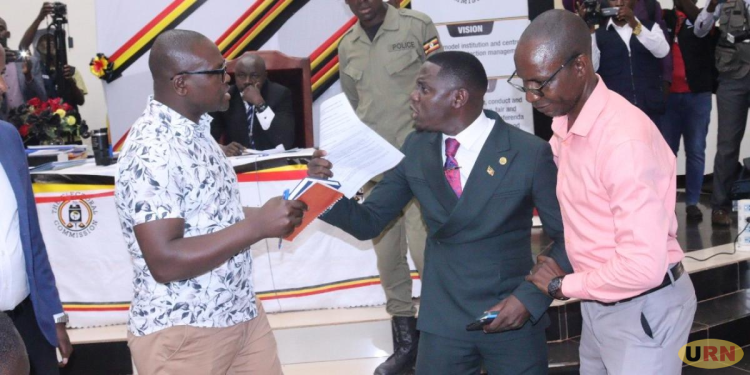There was drama and tension at the Wakiso District headquarters on Thursday morning when independent candidates clashed over campaign symbols during nominations for the Kyadondo East parliamentary race.
The standoff began when Paul Magezi, an independent candidate who had earlier attempted to contest for the presidency, accused the returning officer of unfairly handling the nomination process.
Dressed sharply in an army green suit, Magezi arrived early, expecting to be the first independent candidate nominated. However, tempers flared when Khalid Ssimbwa, another independent, was nominated before him.
“Nomination of independents is first-come, first-served. I came here first,” Magezi shouted, storming the returning officer’s table as plainclothes officers tried to calm him. His outburst drew the attention of other candidates and supporters in the packed nomination hall.
Moments later, another independent, Patience Jackie Nantege, joined the protest, claiming her preferred symbol — a watch — was also being unfairly assigned.
“The reason I came early was to get the watch. The returning officer should be fair,” she protested.
As the standoff grew heated, security officers intervened, but incumbent MP Muwada Nkunyingi of the National Unity Platform (NUP) stepped in to mediate.
“He is a candidate like us. You can’t drag him out. He should be heard,” Nkunyingi said, prompting officers to step back.
Magezi accused Ssimbwa of trying to “steal” his preferred symbol — a ball, which he said represented his connection to the youth. However, the returning officer proceeded calmly with the nominations, assigning Ssimbwa the house symbol instead.
In a twist, the coveted ball symbol was later taken by Tom Muwonge, the outgoing Kasangati LC III chairperson, now vying for the same parliamentary seat. Magezi was eventually nominated after settling for the radio symbol.
A supporter of Ssimbwa told reporters that their team had also hoped to take the ball symbol, citing Ssimbwa’s role in supporting youth sports under the Kyandondo County Club in the Buganda Masaza tournament.
Nantege later secured her preferred watch symbol, ending the morning’s chaotic confrontation.
Meaning Behind the Symbols
While political parties use official logos, independent candidates rely on symbols provided by the Electoral Commission (EC) — visual identifiers that are especially crucial for illiterate voters.
According to Cyprian Ogwang, Head of Research and Planning at the EC, the purpose of these symbols is purely functional:
“These are just symbols. We select them to guide the electorate on polling day. They must not be attached to any cultural or religious sentiment to avoid misuse,” Ogwang explained.
Political analyst Peter Bogere noted that many independents attach deep personal meaning to their chosen symbols.
“Some symbols are now seen as strategic tools for recognition. Candidates fight to get the most popular ones,” he said, pointing out that symbols like the clock are often associated with certain political movements.
Data and Trends
In the 2021 general elections, EC data shows the clock was the most popular independent symbol, chosen by 344 candidates, followed by radio (223), chair (192), and ball (185). Less popular symbols included candle, saucepan, and tree.
For the current elections, the EC has approved 20 symbols for independents, including the ball, book, radio, chair, clock, car, kettle, table, and television, among others.
Symbolism and Politics
The Wakiso confrontation highlights how symbols have become a battleground for political identity and visibility among independents. For many, a symbol is not just a mark on the ballot — it’s a statement of purpose and connection to voters.
Major political parties also rely on iconic logos:
-
NRM – Yellow Bus
-
NUP – Umbrella
-
FDC – Key
-
DP – Hoe
-
ANT – Light Bulb
Others include the Peace Sign for the Conservative Party, Tree for the Democratic Front, and Microphone for the Ecological Party of Uganda.
The morning’s scuffle in Wakiso served as a vivid reminder that even the smallest symbols can carry the weight of big political ambitions.
